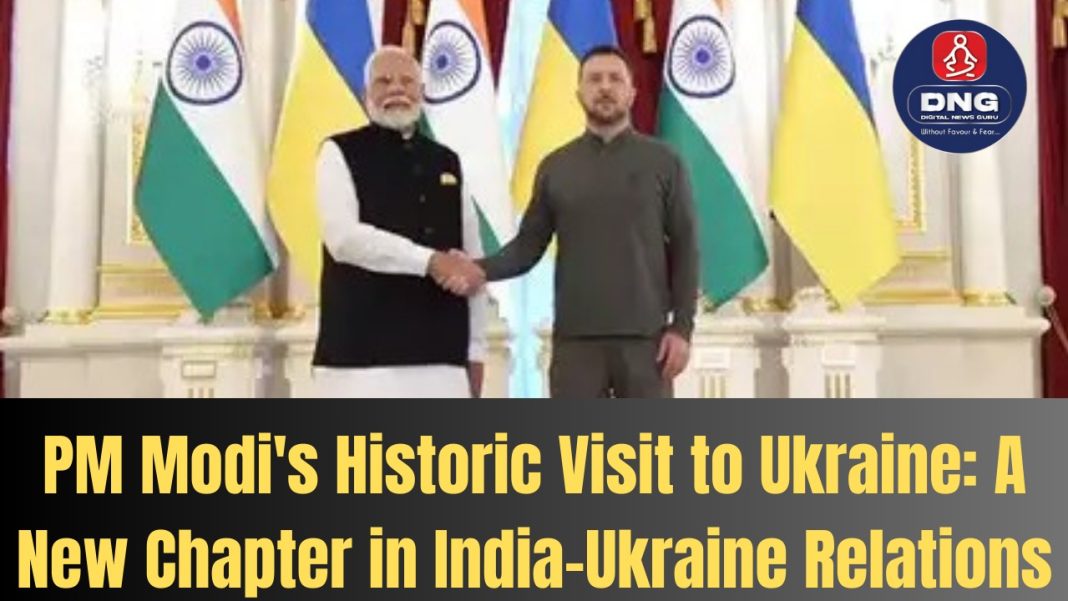DIGITAL NEWS GURU INTERNATIONAL DESK:
PM Modi’s Historic Visit to Ukraine: A New Chapter in India-Ukraine Relations
Indian Prime Minister Narendra Modi’s visit to Ukraine on August 23, 2024, marks a significant milestone in the diplomatic relations between India and Ukraine.
This historic visit, the first by an Indian Prime Minister to Ukraine, comes amidst the ongoing conflict in Eastern Europe, where Ukraine has been embroiled in a war with Russia since 2014, escalating to new heights in 2022. Modi’s visit is seen as a strong statement of India’s growing role in global diplomacy and its commitment to peace and stability in the region.
Background and Context
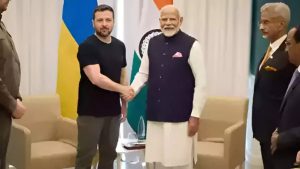
Ukraine has been at the center of global attention due to its conflict with Russia, which began with Russia’s annexation of Crimea in 2014 and further escalated into a full-scale invasion in 2022. The conflict has led to significant geopolitical shifts, affecting not just Europe but the entire world. India, traditionally maintaining a neutral stance in conflicts involving major powers, has found itself navigating a complex diplomatic path.
India’s relations with Ukraine and Russia have both been historically significant. While India has longstanding ties with Russia, especially in defense and strategic sectors, its relationship with Ukraine has primarily been economic, focusing on areas like pharmaceuticals, education, and technology. However, the ongoing conflict and global geopolitical shifts have necessitated a recalibration of India’s foreign policy, leading to Modi’s visit to Ukraine.
Key Objectives of the Visit
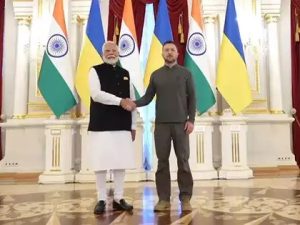
Modi’s visit to Ukraine is driven by several key objectives, reflecting India’s broader strategic goals in the region and on the global stage.
- Peace and Stability: One of the primary goals of the visit is to promote peace and stability in the region. Modi’s discussions with Ukrainian President Volodymyr Zelensky are expected to focus on finding peaceful solutions to the conflict. India, as a major global power, has been advocating for diplomatic solutions and has offered to mediate between the conflicting parties. Modi’s visit underscores India’s commitment to playing a constructive role in global peace efforts.
- Humanitarian Support: Another critical aspect of the visit is to assess the humanitarian situation in Ukraine. The conflict has resulted in a significant humanitarian crisis, with millions of people displaced and in need of aid. India has already extended humanitarian assistance to Ukraine, and Modi’s visit is likely to include discussions on further support, including medical aid, reconstruction efforts, and support for displaced populations.
- Strengthening Bilateral Relations: Modi’s visit also aims to strengthen the bilateral relations between India and Ukraine. While the two countries have had strong economic ties, there is potential for further collaboration in areas such as defense, technology, and education. Modi is expected to explore new avenues of cooperation that could benefit both nations, particularly in the context of post-war reconstruction and development.
- Global Diplomatic Positioning: On a broader scale, Modi’s visit to Ukraine is also about positioning India as a key player in global diplomacy. By engaging directly with Ukraine, India is sending a message about its willingness to take on a more active role in resolving global conflicts. This is in line with India’s aspirations to be a global leader and a permanent member of the United Nations Security Council.
Significance of the Visit
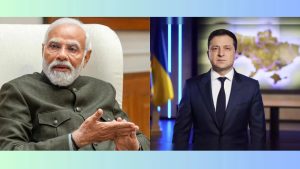
Modi’s visit is historic not only because it is the first by an Indian Prime Minister to Ukraine but also because of the timing and the geopolitical context in which it is taking place. The visit is seen as a bold move, given India’s traditionally cautious approach to conflicts involving major powers. It reflects India’s growing confidence in its global diplomatic role and its willingness to engage directly with countries in conflict zones.
The visit is also significant for Ukraine, which has been seeking greater international support in its struggle against Russian aggression. Modi’s visit is likely to be seen as a boost for Ukraine, not just in terms of diplomatic support but also in terms of the potential for increased economic and humanitarian aid from India.
Challenges and Criticisms
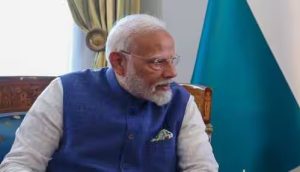
However, Modi’s visit is not without its challenges. India’s balancing act between its relationships with Russia and Ukraine is delicate. Russia has been a close ally of India, particularly in defense matters, and any perceived shift in India’s stance could have implications for this relationship. Modi will need to navigate these complexities carefully to ensure that India’s strategic interests are protected while also supporting Ukraine.
Critics may argue that India should have taken a more decisive stance earlier in the conflict. Some Western nations have called for stronger condemnation of Russia’s actions, and India’s more neutral stance has been a point of contention. Modi’s visit could be seen as an attempt to address some of these criticisms by showing a more active engagement in the conflict resolution process.
Conclusion
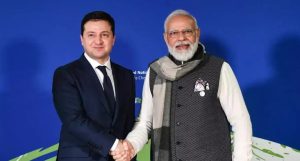
Prime Minister Narendra Modi’s visit to Ukraine is a historic moment in India-Ukraine relations and a significant step in India’s global diplomatic journey. By engaging directly with Ukraine, Modi is positioning India as a key player in global efforts to resolve conflicts and promote peace. The visit reflects India’s growing confidence on the world stage and its commitment to being a force for good in global affairs.
As the world watches, the outcomes of Modi’s visit will likely have far-reaching implications, not just for India and Ukraine, but for global geopolitics as a whole. Whether it leads to concrete steps towards peace in Ukraine or opens new avenues of cooperation between India and Ukraine, the visit is undoubtedly a landmark event in India’s foreign policy.
YOU MAY ALSO READ: Bharat Bandh Today: A Nationwide Protest Against Supreme Court’s Reservation Ruling



